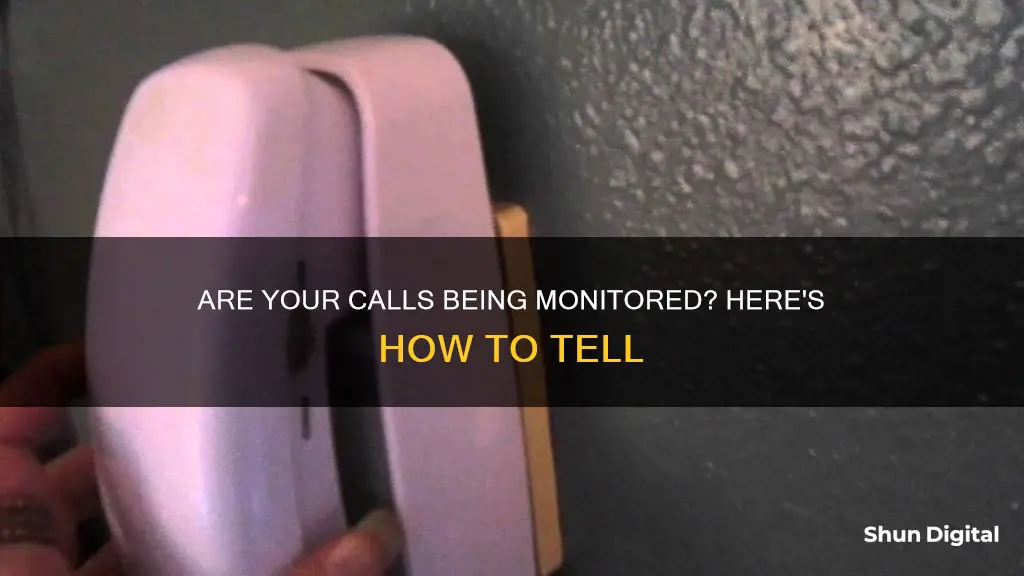
With the invention of new surveillance technology, it is easier than ever for someone to monitor your phone calls. While monitoring tools are sometimes used for parental control or to monitor employees' activities, they can also be used to invade your privacy and access your private data. There are several signs that may indicate that someone is monitoring your phone calls, including increased data usage, unusual permission requests, higher battery consumption, and background noises during calls. If you suspect that your phone is being monitored, it is important to take action to protect your privacy and personal information.
| Characteristics | Values |
|---|---|
| Unusual sounds during calls | Clicking sounds, static, or mumbling, distant and faint voices |
| Decreased battery performance | Battery drains while resting |
| Unusual phone activity when not in use | Screen lighting up, receiving calls and notifications while in silent mode |
| Trouble shutting down | Taking longer than usual to turn off |
| Websites look different | Malware could change the way your phone handles tasks |
| Unusually hot battery | Spyware can run resource-intensive operations in the background |
| Unusual texts | Strange text messages containing random numbers, symbols, or characters |
| Cameras and microphones turn on randomly | An orange or green dot at the top of your phone’s screen |
| Increased data usage | Spy apps use large amounts of data to export the information collected from your phone |
What You'll Learn

Odd sounds during calls
Odd sounds during your calls can be a sign that someone is monitoring your calls. Background noises such as clicking, buzzing, static, or mumbling, distant, and faint voices could indicate that someone is eavesdropping on your conversation. However, if you hear these sounds occasionally, it could just be due to a poor signal. If you hear them frequently, your phone may have been tapped.
In the days of analog cell phone networks, weird noises and unstable connections were common. However, today's all-digital cell networks usually provide stable and mostly noise-free connections. So, if you hear strange noises or a voice that doesn't belong to the person you called, it's possible that someone is monitoring or recording your call.
If you suspect that your calls are being monitored, you should also look out for other signs, such as increased data usage, decreased battery performance, and unusual phone activity when not in use. You can also use antivirus apps to scan your device for spyware and other malicious software.
Assembling the Acer LCD Monitor CB281HK: A Step-by-Step Guide
You may want to see also

Increased data usage
If you suspect your phone is being monitored, you can check your data usage. On an iPhone, go to Settings, then Mobile Data. On an Android, go to Settings, then Network & Internet, then Data Usage.
If you notice a sharp increase in data usage that you can't explain, it could be due to spyware. However, it's important to rule out any legitimate apps by checking their data consumption and behaviour. For example, a new podcast app could be responsible for a spike in data usage if it's downloading lots of episodes.
It's also worth noting that increased data usage could be caused by other forms of malware, such as adware.
Hooking Up Multiple Monitors to Your GeForce Graphics Card
You may want to see also

Phone activity when not in use
Unusual phone activity when the device is not in use is one of the tell-tale signs that someone is tracking, tapping, or monitoring your phone. Here are some specific things to look out for:
- The phone turning off and on by itself: While automatic updates can cause restarts, unexplained reboots may be a cause for concern. Spyware may be initiating restarts to install new components or hide its activity.
- Apps opening and closing on their own: Unexpected app activity could indicate rogue software. Spyware may launch specific apps to record data (like calls or keystrokes) or activate the camera or microphone without your knowledge.
- Notifications while in silent mode: If you see excessive notifications while your phone isn't in use, it could mean someone has tapped your phone.
- The phone making noises or the screen lighting up when not in use: This could indicate that someone has hacked your phone.
If you are also experiencing unexplained device reboots, it is highly likely that someone has remote access to your phone.
Hooking Up Speakers to a VGA Monitor: A Step-by-Step Guide
You may want to see also

High battery consumption
Spyware apps require a significant amount of power to run constantly in the background, collecting and transmitting data. This can result in increased battery usage and faster drainage. It is important to note that all batteries degrade over time, so a sudden and significant change in battery performance is a cause for suspicion.
To check for high battery consumption, you can review your battery usage data. Both Android and iPhone devices provide information about battery life and usage. By checking which apps are using the most battery power, you can identify any unusual activity. Additionally, comparing your battery usage with similar devices can help determine if your phone is consuming more power than expected.
It is worth noting that other factors can also contribute to high battery consumption, such as streaming media or playing games. However, if your battery drains rapidly while idle, it could indicate the presence of spyware or a defective device.
Monitoring Data Usage: Tracfone's Easy Steps to Track
You may want to see also

Permission requests
Unusual and Strange Permission Requests
Be cautious of permission requests that don't make sense for the app's intended function. For example, a reminder app shouldn't need access to your camera or voice recording permission. These unusual permission requests could indicate that the app is attempting to spy on you. With camera access, the app could secretly take photos, and with voice recording permission, it could eavesdrop on your conversations.
Suspicious Permission Requests
If your phone starts asking for random or suspicious permissions, someone may be trying to access more of your data. Never grant permissions unless you understand the reason for the request and can fully trust the app. Always question why an app or service needs to use your camera or access your microphone, for instance.
Review an App's Permissions Before Installing
Before installing an app, review its permissions. You can also see a permission access pop-up when opening a newly installed app. Be strict with the permissions you grant, especially for access to location, photos, or microphone data. Also, limit permissions to apps you don't use often as an extra layer of protection.
Excessive Background Data Usage
Frequently monitor your device's background data usage. If it's higher than expected, investigate which apps are using the most data. Ensure that you don't have an active hotspot enabled, and if you do, verify that there are no unauthorized devices connected.
Uninstall Suspicious Apps
If you spot an unknown app on your device, consider it a red flag. Research the app to see if it has been reported as dangerous, and delete it immediately if you're concerned. Phone manufacturers announce new apps coming to your phone with software updates, so it will become clear if the app is legitimate or not.
Use Antivirus Software
Use a good antivirus program to scan your device for any hidden apps with harmful intent. A good antivirus program will also protect your phone from being infected with spyware in the first place.
Repairing LCD Monitor Power Supply Issues: A Step-by-Step Guide
You may want to see also
Frequently asked questions
There are several signs that may indicate someone is monitoring your calls, including increased data usage, unusual permission requests, higher battery consumption, and background noises during calls.
Some common signs of spyware on your phone include increased data usage, rapid battery drain, unusual permission requests, and strange background noises during calls.
Yes, with the right spyware, someone can eavesdrop on your phone calls without your knowledge. All they need is access to your device and a few minutes to download the spyware.
There are several signs that may indicate your phone is being monitored without your knowledge, including increased data usage, phone activity when not in use, rapid battery drain, and unusual permission requests.
If you suspect that someone is monitoring your calls, it is important to take action. You can start by checking your phone settings and apps for any signs of spyware or unusual activity. You can also consider using a security app to scan your phone for spyware and protect your data.







